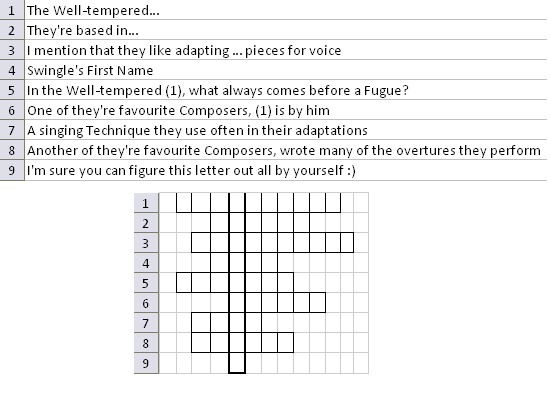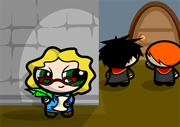Morag's Music
Mozart, Bach and Co., also known as Swingle?
Morag McQueen
This is my first column ever, and in it I would like to introduce you all to the world of music in a fun way. I will work my way through various areas of music, starting with a bit of musical history, or to be more exact, how historical composers can be modern too. Whether you like classical or jazz or are just interested in listening to something different, I'm sure you'll find this interesting. At least I hope you will!
The Swingle Singers, whom I'd like to introduce you to in this month's column, do something that few others would dare: they take well-known classical pieces and sing them, usually with a jazz technique called scat. They usually just sing songs, but when they're being even more daring, they sing sonatas, fugues, and similar pieces for piano, violin, or even other instruments. To be extremely daring, they perform overtures for example, written for whole orchestras. Scat is basically a group of meaningless syllables that sound like a saxophone or trumpet, and is often used by jazz musicians, either alone or in-between two verses in a song. It looks something like this on paper: dua duap bap bap bap bap dua dua dua dua duap ba. Letters like t or p at the end of a syllable are often just to indicate a short vowel and are not sung at all.
Now, take this bit of information and imagine hearing a Bach fugue or an overture from one of Mozart's operas sung like this. You can't? Check out http://www.swinglesingers.com and take a listen to some of their music.
It certainly shines a new light on classical music, though I like both these jazzed-up versions and the originals.
Ward Swingle, an American musician from Alabama, USA, had this ingenious idea when he was living in France, back in 1963, to get together a group of singers to sing many different styles of music as vocal jazz. These original Swingle Singers, despite being amazing musicians, were frowned upon by many, especially British singers, simply because they tended to put rhythm before voice. They were all professional singers and they did have nice voices, but they didn't have as full a sound as some people think a singer should have. However, they did an amazing job at rhythmic work in all their pieces. Even with these obstacles, they quickly climbed the ladder of success, staying in the charts for over a year and winning Grammy Awards for several of their records. Bach, you could say, helped them on their way to greatness, providing the perfect music for them with his Well-tempered Clavichord and various other pieces, as well as some of his sons' music. The Well-tempered Clavichord is essentially a book of preludes and fugues by Bach, each key having one prelude and one fugue, making a total of 24 preludes and fugues each. As the name suggests, all these pieces were written for a piano originally, but as Ward Swingle figured out, they are really well-suited for singing too, having just the right range of tones and not being too taxing for a voice, rhythmically as well as melodically. From here, they went on to the whole Bach family, as well as Mozart, from whom they also adapted many orchestral pieces, such as overtures to his operas, not just etudes, fugues and concertos. Throughout the years they found more and more composers whose music was also suitable for singing, if adapted properly. The technique Ward uses is called scat singing, which I explained above. What I didn't mention however, is that it consists of seemingly haphazardly-chosen syllables strung together, but is actually thought through thoroughly. Each musician or composer chooses the syllables that fit his or her needs at the time. While this happens faster and more freely in improvisation and is, in that sense haphazard, each syllable still has its own purpose to the singer. Ward takes this whole meaning even further by choosing each syllable carefully when adapting the music for voice. Note for note, he makes sure that every word is just right and sounds exactly the way he wants it to. Listening to their music, you hear that it's just right, but you still can't even begin to imagine the hours he must have put into each piece. They make everything sound easy and natural.
In 1973, Ward, moving to England, disbanded this French group. He didn't forget his idea, though; he simply started up another group of Swingle Singers in England. They still exist today. Ward has been a part of the group actively until 1985, and then continuing as their musical adviser. Though they've remained in the original formation, voice-wise, the singers have obviously changed throughout the years. There are still four parts, with two people per part, meaning that every single singer has to be 150% sure of what they're doing at all times. Since their start in London, England, they've drastically expanded their repertoire. Not only that, but Swingle Singing has actually turned into a style of singing in the world of music.
Since their first days of winning awards, they have won many more, either as a group, or for Ward Swingle himself, for services to music and art.
The Group today is as follows:
Sopranos: Julie Kench, Meinir Thomas
Altos: Johanna Marshall, Kineret Maor
Tenors: Thomas Bullard (Musical Director), Richard Eleson
Basses: Tobias Hug, Jeremy Sadler
CROSSWORD MUSIC PUZZLE

